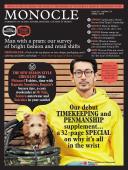
Issue 92
Man with a pram: our survey of bright fashion and retail shifts. Spring release: a look at the top players in store design, packaging, men’s tailoring and fabric technology — (more than 64 pages of sharp coverage)
In This Issue
Oops! No content was found.
Looks like we no longer have content for the page you're on. Perhaps try a search?
Return Home

